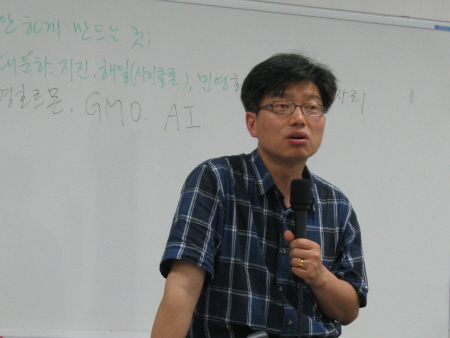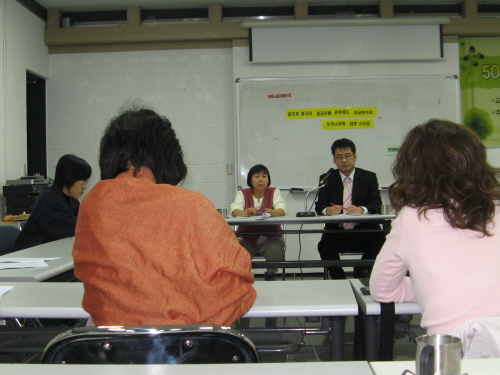2nd Labor Forum held: "How to obtain equal pay for work of equal value legally"
HOT ISSUES & NOTICE 2008. 7. 22. 23:032nd Labor Forum held: "How to obtain equal pay for work of equal value legally"
Subsequently after addressing equal pay for work of equal value enhancing systems in the US and UK in the 1st forum, on July 3, 2008, the 2nd Labor Forum looked at "how to obtain equal pay for work of equal value legally."
Professor Kim Ellim (working for Korea National Open University) brought up topics for discussion about legal history of equal pay for work of equal value stipulated in the Equal Employment Act; equal pay for work of equal value stipulated in international conventions; related regulations and precedents in major foreign countries; and related regulations and precedents in Korea. 1989 marked for the first time when the principle of equal pay for work of equal value was stipulated. However, there are no detailed regulations or guidelines to put the principle in force, and it is just an established rule that government officers in charge refer to for their fulfillment. The established rule has not been amended yet. In 1999 the first case (a lawsuit instituted by cleaners working at the Yonsei University) regarding equal pay for work of equal value was brought before the court, but they failed. In 2003, it was the first time when gender discrimination was admitted to be socially prevalent, bottomed upon the principle of equal pay for work of equal value. Professor Kim evaluated disputes and future tasks regarding standards of equal pay for work of equal value and its application methods have been generated, since the 2003's precedent did not carry out job evaluation method neither provided detailed analysis basis in terms of judging equal pay for work of equal value.
In addition, Professor Kim suggested a guideline for the application of equal pay for work of equal value. In the US and EU where equal pay for work of equal value are actively carried out, guidelines and handbooks regarding the principle are well-prepared to consolidate its effectiveness. However, in the Korean society, only the Equal Employment Act regulating the principle of equal pay for work of equal value exists, not its detailed regulations nor guidelines. Therefore, essential and necessary are independent guidelines to make detailed application of the principle in Korea.
Amid the tough situation in which women irregular workers account for 70% out of all women workers, a participant pointed out the limitation of the equal pay for work of equal value related regulation, because there is the decreasing number of male workers 'in the same workplaces,' who can be compared with women workers in practice. Professor Kim answered that gradual enforcement of the principle is needed because the principle of equal pay for work of equal value is not kept nor raised in applying the principle to similar jobs where the principle should have been originally put in force. However, she also mentioned we should consider job evaluation based on seniority rather than emphasizing only class of workers' positions.
The 2nd Labor Forum was a primary source of our looking at the present situation in relation to equal pay for work of equal value, and offered a good opportunity for us to investigate what we at KWWA should do in this tough present situation.




 During the last holidays on May 2nd and 3rd, 2008 unusual incidents caught our eyes at the Cheonggyecheon Plaza. In the evening on the last May 2nd, unexpectedly massive citizens and netizens gathered together, lodging a protest against U.S. beef contaminated by mad cow diseases, at a candlelight vigil. Another candle demonstrations coloring the Cheonggyecheon Plaza red with red candlelights, were organized on the following day, and in May 6th evening, similar kinds of rallies were planned to be organized at Yeoido and the Cheonggyecheon Plaza, respectively.
During the last holidays on May 2nd and 3rd, 2008 unusual incidents caught our eyes at the Cheonggyecheon Plaza. In the evening on the last May 2nd, unexpectedly massive citizens and netizens gathered together, lodging a protest against U.S. beef contaminated by mad cow diseases, at a candlelight vigil. Another candle demonstrations coloring the Cheonggyecheon Plaza red with red candlelights, were organized on the following day, and in May 6th evening, similar kinds of rallies were planned to be organized at Yeoido and the Cheonggyecheon Plaza, respectively.  On May 7th, 2008, Korean Women Workers Association(KWWA) and Korean Women's Trade Union (KWTU) organized the first Korean women workers' forum entitled "comparative analysis of wage discrimination prevention systems in the U.S. and U.K. and their implications to Korea", in order to achieve equal pay for work of equal value and gender sensitive job evaluation (presented by professor Oh Kye Taek) at KWWA's seminar room. In this forum, U.S. and U.K.'s legal basis and operating organizations of equal pay for work of equal value, legal explanation and evaluation methods regarding equal pay for work of equal value.
On May 7th, 2008, Korean Women Workers Association(KWWA) and Korean Women's Trade Union (KWTU) organized the first Korean women workers' forum entitled "comparative analysis of wage discrimination prevention systems in the U.S. and U.K. and their implications to Korea", in order to achieve equal pay for work of equal value and gender sensitive job evaluation (presented by professor Oh Kye Taek) at KWWA's seminar room. In this forum, U.S. and U.K.'s legal basis and operating organizations of equal pay for work of equal value, legal explanation and evaluation methods regarding equal pay for work of equal value. 
